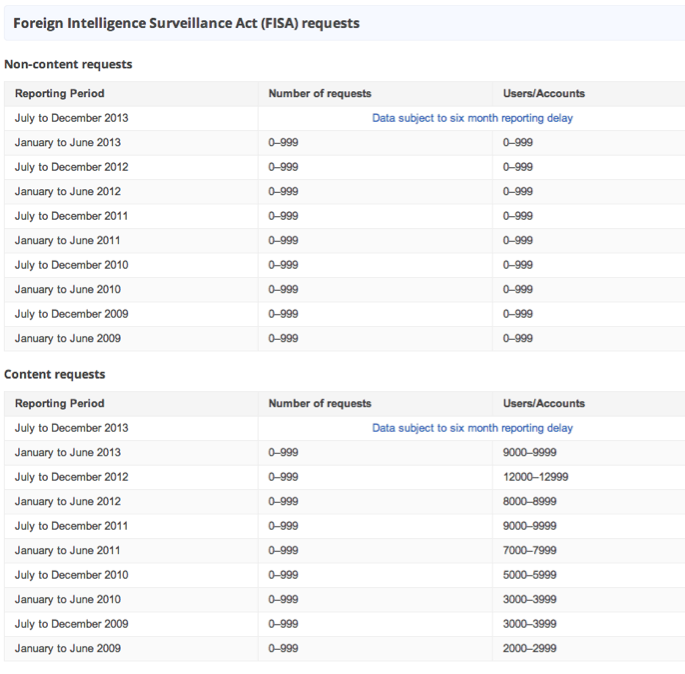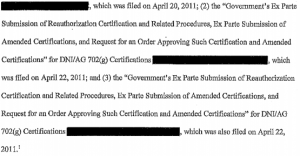Between Two Ends of the WikiLeaks Investigation: Parallel Constructing the FBI’s Secret Authorities
Two pieces of news on the government’s investigation of WikIleaks came out yesterday.
At the Intercept, Glenn Greenwald reported:
- In 2010, a “Manhunting Timeline” described efforts to get another country to prosecute what it called the “rogue” website
- In a targeting scenario dating to July 25, 2011, the US’ Targeting and General Counsel personnel responded to a question about targeting WikiLeaks’ or Pirate Bay’s server by saying they’d have to get back to the questioner
- In 2012, GCHQ monitored WikiLeaks — including its US readers — to demonstrate the power of its ANTICRISIS GIRL initiative

Also yesterday, Alexa O’Brien reported (and contextualized with links back to her earlier extensive reporting):
- The grand jury investigation of WikiLeaks started at least as early as September 23, 2010
- On January 4, 2011 (21 days after the December 14, 201 administrative subpoena for Twitter records on Appelbaum and others), DOJ requested Jacob Appelbaum’s Gmail records
- On April 15, 2011, DOJ requested Jacob Appelbaum’s Sonic records
Now, as O’Brien lays out in her post, at various times during the investigation of WikiLeaks, it has been called a Computer Fraud and Abuse investigation, an Espionage investigation, and a terrorism investigation.
Which raises the question why, long after DOJ had deemed the WikiLeaks case a national security case that under either the terrorism or Espionage designation would grant them authority to use tools like National Security Letters, they were still using subpoenas that were getting challenged and noticed to Appelbaum? Why, if they were conducting an investigation that afforded them all the gagged orders they might want, were they issuing subpoenas that ultimately got challenged and exposed?
Before you answer “parallel construction,” lets reconsider something I’ve been mulling since the very first Edward Snowden disclosure: the secret authority DOJ and FBI (and potentially other agencies) used to investigate not just WikiLeaks, but also WikiLeaks’ supporters.
Back in June 2011, EPIC FOIAed DOJ and FBI (but not NSA) for records relating to the government’s investigation of WikiLeaks supporters.
EPIC’s FOIA asked for information designed to expose whether innocent readers and supporters of WikiLeaks had been swept up in the investigation. It asked for:
- All records regarding any individuals targeted for surveillance for support for or interest in WikiLeaks;
- All records regarding lists of names of individuals who have demonstrated support for or interest in WikiLeaks;
- All records of any agency communications with Internet and social media companies including, but not limited to Facebook and Google, regarding lists of individuals who have demonstrated, through advocacy or other means, support for or interest in WikiLeaks; and
- All records of any agency communications with financial services companies including, but not limited to Visa, MasterCard, and PayPal, regarding lists of individuals who have demonstrated, through monetary donations or other means, support or interest in WikiLeaks. [my emphasis]
In their motion for summary judgment last February, DOJ said a lot of interesting things about the records-but-not-lists they might or might not have and generally subsumed the entire request under an ongoing investigation FOIA exemption.
Most interesting, however, is in also claiming that some statute prevented them from turning these records over to EPIC, they refused to identify the statute they might have been using to investigate WikiLeaks’ supporters.
All three units at DOJ — as reflected in declarations from FBI’s David Hardy, National Security Division’s Mark Bradley, and Criminal Division’s John Cunningham – claimed the files at issue were protected by statute.
None named the statute in question. All three included some version of this statement, explaining they could only name the statute in their classified declarations.
The FBI has determined that an Exemption 3 statute applies and protects responsive information from the pending investigative files from disclosure. However, to disclose which statute or further discuss its application publicly would undermine interests protected by Exemption 7(A), as well as by the withholding statute. I have further discussed this exemption in my in camera, ex parte declaration, which is being submitted to the Court simultaneously with this declaration
In fact, it appears the only reason that Cunningham submitted a sealed declaration was to explain his Exemption 3 invocation.
And then, as if DOJ didn’t trust the Court to keep sealed declarations secret, it added this plaintive request in the motion itself.
Defendants respectfully request that the Court not identify the Exemption 3 statute(s) at issue, or reveal any of the other information provided in Defendants’ ex parte and in camera submissions.
DOJ refuses to reveal precisely what EPIC seems to be seeking: what kind of secret laws it is using to investigate innocent supporters of WikiLeaks.
Invoking a statutory exemption but refusing to identify the statute was, as far as I’ve been able to learn, unprecedented in FOIA litigation.
The case is still languishing at the DC District.
I suggested at the time that the statute in question was likely Section 215; I suspected at the time they refused to identify Section 215 because they didn’t want to reveal what Edward Snowden revealed for them four months later: that the government uses Section 215 for bulk collection.
While they may well have used Section 215 (particularly to collect records, if they did collect them, from Visa, MasterCard, and PayPal — but note FBI, not NSA, would have wielded the Section 215 orders in that case), they couldn’t have used the NSA phone dragnet to identify supporters unless they got the FISC to approve WikiLeaks as an associate of al Qaeda (update: Or got someone at NSA’s OGC to claim there were reasons to believe WikiLeaks was associated with al Qaeda). They could, however, have used Section 215 to create their own little mini WikiLeaks dragnet.


![[NSA presentation, PRISM collection dates, via Washington Post]](http://www.emptywheel.net/wp-content/uploads/2013/06/WaPo_Prism-Slide5_06JUN2013_300pxw.jpg)
